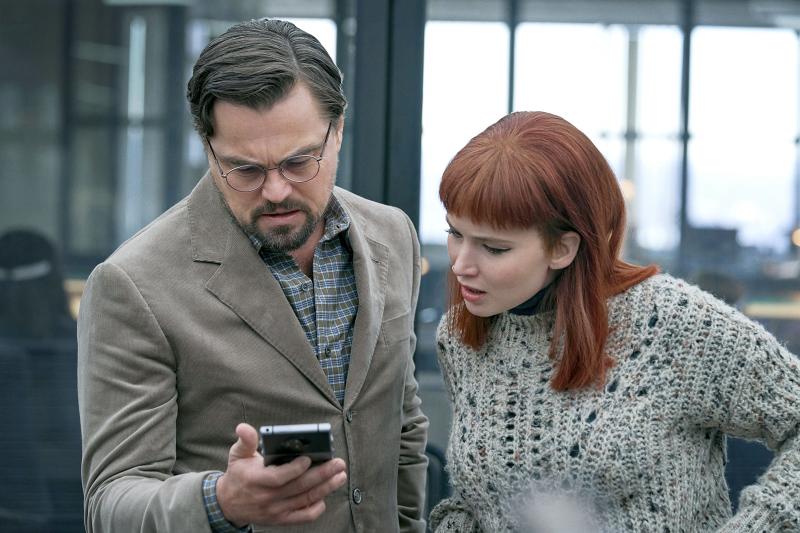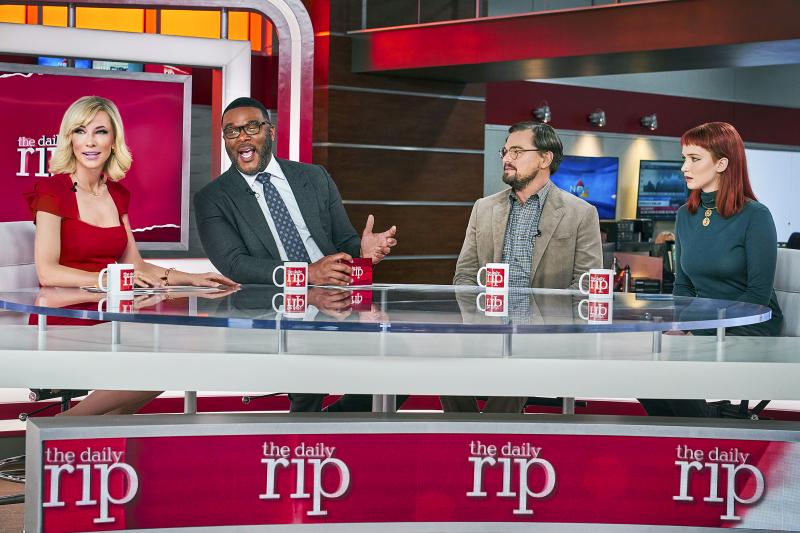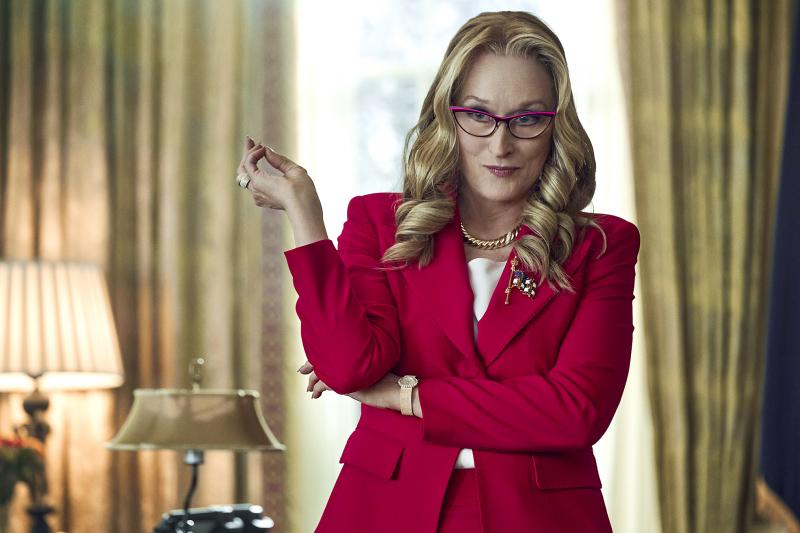You know you’re in deep doodoo when that planet-destroying comet on a collision course with Earth isn’t your biggest problem.
Your biggest problem: You’re the scientist who discovered the darned thing but nobody has the patience or the bandwidth or the political will to believe it. And it’s coming. In six months. That’s a fact.
That the comet is a stand-in for climate change is hardly a secret going into Don’t Look Up, Adam McKay’s exceedingly watchable, funny and star-studded yet somewhat chaotic satire. For one thing, its star is Leonardo DiCaprio, for whom climate change awareness is a passion.

Photo: Netflix via AP
What becomes clear soon enough is that the film is also about the pandemic, and vaccine resistance, and the tendency in American society for issues that have nothing to do with politics to become hopelessly political.
Don’t Look Up sees McKay (Anchorman: The Legend of Ron Burgundy and Talladega Nights) returning to comedy after turning to darker, political themes in The Big Short, about the 2008 financial crisis, and Vice, his Dick Cheney biopic.
As those last two films showed, McKay’s filmmaking can be dazzling, brainy and so fast-moving that one had better not sneeze for even a moment. The material is less dense here — the utter simplicity of a comet headed toward Earth is the whole point, really — and nobody suddenly launches into iambic pentameter, as Christian Bale and Amy Adams memorably did in Vice (although come to think of it, there are actors here who’d be perfect — we have Meryl Streep and Mark Rylance, for heaven’s sake).

Photo: Netflix via AP
But while I enjoyed the mix of humor and emotion (and outright terror) — there are laugh-out-loud moments and also deeply poignant ones — some might find the tonal shifts a bit jarring. Perhaps a more valid nit to pick is that the the jampacked script doesn’t quite do all these movie stars justice. And what a group McKay has assembled: DiCaprio, Jennifer Lawrence, Streep, Cate Blanchett, Rylance, Jonah Hill, Timothee Chalamet, Tyler Perry, among others. Not to mention Ariana Grande, who nails her performance of a hilarious theme song.
We begin at Michigan State University, where, in a terrific pre-credits sequence, astronomy grad student Kate Dibiasky (Lawrence, feisty and funny and perfect), doing some telescope work one day, is stunned to realize she’s discovered a comet.
But when her mentor, Prof Randall Mindy (DiCaprio, toning down his charisma to portray a nerdy academic prone to panic attacks), does some calculations, he can’t believe his eyes: The “planet killer” comet will hit Earth in six months.

Photo: Netflix via AP
Soon the pair are in touch with the Planetary Defense Coordination Office (a real thing), and flying to Washington to meet with the self-involved, inept and somewhat corrupt President Orlean (Streep, with 20-something hair and pointy red glasses). In the Oval Office, nobody is too worried, least of all Orlean’s insufferable son and chief of staff, Jason (an obnoxiously funny Hill, clearly improvising much of the time). Jason is particularly dubious because Randall and Kate are not Ivy Leaguers: Watch JLaw offer to show her SAT scores.
As for POTUS, who’s in the middle of a scandal with her Supreme Court nominee, she has one, impatient question: “OK, what’s the ASK here?”
The only choice is to go to the media. That doesn’t go too well either. On a popular morning show, The Daily Rip, their hosts (Tyler Perry and Cate Blanchett, having lots of fun) don’t get the point either, and the message gets lost amid memes about Randall’s nerdy attractiveness and Kate’s on-air explosion (“We’re all gonna die!” she screams.)
Meanwhile, an attempted lifesaving mission onto the comet — a la Armageddon — encounters its own problems. And then tech billionaire Peter Isherwall gets involved. Rylance, masterful at playing strange types, has perhaps never looked or sounded quite this weird, with his perfect hair and too-white teeth. Through this not-quite-developed character, McKay conveys his obvious disdain for the billionaires currently cavorting in space.
Then there are the conspiracy theorists. Their slogan? You guessed it: “DON’T LOOK UP.”
Finally comes the “Network” moment — the moment we’ll see in DiCaprio’s awards clip, when he breaks down on television to tell the world his own, updated version of the famous “I’m mad as hell and I’m not going to take this anymore!” speech.
If much of the movie is played for laughs, this part clearly isn’t. Nor is the stunning moment when Randall looks at the sky and finally sees the comet — terrifying but also beautiful. At these moments, and the quiet ones where McKay cuts away for lovely shots of wildlife, the film arguably works best: cutting through the clutter and showing what’s really at stake.
Don’t Look Up, a Netflix release, has been rated R by the Motion Picture Association of America “for language throughout, some sexual content, graphic nudity and drug content.” Running time: 145 minutes.

June 2 to June 8 Taiwan’s woodcutters believe that if they see even one speck of red in their cooked rice, no matter how small, an accident is going to happen. Peng Chin-tian (彭錦田) swears that this has proven to be true at every stop during his decades-long career in the logging industry. Along with mining, timber harvesting was once considered the most dangerous profession in Taiwan. Not only were mishaps common during all stages of processing, it was difficult to transport the injured to get medical treatment. Many died during the arduous journey. Peng recounts some of his accidents in

“Why does Taiwan identity decline?”a group of researchers lead by University of Nevada political scientist Austin Wang (王宏恩) asked in a recent paper. After all, it is not difficult to explain the rise in Taiwanese identity after the early 1990s. But no model predicted its decline during the 2016-2018 period, they say. After testing various alternative explanations, Wang et al argue that the fall-off in Taiwanese identity during that period is related to voter hedging based on the performance of the Democratic Progressive Party (DPP). Since the DPP is perceived as the guardian of Taiwan identity, when it performs well,

A short walk beneath the dense Amazon canopy, the forest abruptly opens up. Fallen logs are rotting, the trees grow sparser and the temperature rises in places sunlight hits the ground. This is what 24 years of severe drought looks like in the world’s largest rainforest. But this patch of degraded forest, about the size of a soccer field, is a scientific experiment. Launched in 2000 by Brazilian and British scientists, Esecaflor — short for “Forest Drought Study Project” in Portuguese — set out to simulate a future in which the changing climate could deplete the Amazon of rainfall. It is

Artifacts found at archeological sites in France and Spain along the Bay of Biscay shoreline show that humans have been crafting tools from whale bones since more than 20,000 years ago, illustrating anew the resourcefulness of prehistoric people. The tools, primarily hunting implements such as projectile points, were fashioned from the bones of at least five species of large whales, the researchers said. Bones from sperm whales were the most abundant, followed by fin whales, gray whales, right or bowhead whales — two species indistinguishable with the analytical method used in the study — and blue whales. With seafaring capabilities by humans